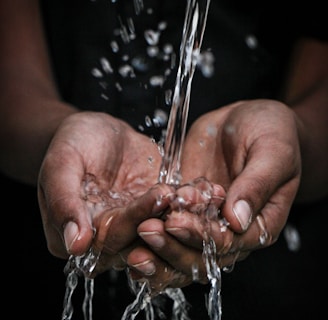And if I told you that water isn't the most hydrating drink?
Water is ubiquitous in our lives. We find it in our taps, in the bottles we buy at the supermarket, and even in the food we consume. We've been told since childhood that we need to drink at least two liters of water a day to be healthy. But what is it really? Is water really the most hydrating drink?
HEALTHBLOG-LIST
6/24/20243 min read


Water: effective for rapid hydration, but not optimal in the long term
It is true that water is very effective in hydrating the body quickly. When we drink a glass of water, the water is absorbed by the intestine and passes quickly into the bloodstream. This helps to rehydrate the body and provide it with the minerals it needs.
However, water is not optimal for maintaining hydration over the long term. This is because water is quickly eliminated by the kidneys in the form of urine. This means that you need to drink it constantly to stay hydrated. In addition, water does not contain electrolytes, those essential minerals for the body's water balance.
Electrolytes: the keys to sustainable hydration
Electrolytes, such as sodium, potassium, and magnesium, play a crucial role in hydration. They help retain water in cells and prevent dehydration. When we lose electrolytes, such as through sweating profusely, it is important to replenish them to stay hydrated.
Electrolyte-rich beverages: the best allies for hydration
Many drinks are more effective than water at hydrating the body over the long term. This is because they contain electrolytes that help retain water in cells and prevent dehydration. Here are a few examples of electrolyte-rich beverages:
Milk: Milk is a naturally electrolyte-rich beverage, particularly in calcium and potassium. It is also very nourishing and satisfying, making it an excellent choice for a healthy and hydrating snack.
Coconut water: Coconut water is a natural beverage rich in electrolytes, especially potassium. It is also very refreshing and has a slightly sweet taste. It is an excellent alternative to plain water, especially in hot weather.
Fruit and vegetable juices: Fresh fruit and vegetable juices are a good source of vitamins, minerals, and electrolytes. They can be a great way to hydrate and stock up on nutrients. However, it is important to choose juices without added sugar, as sugar can have a dehydrating effect.
Herbal teas: Herbal teas are a healthy and flavorful alternative to water. Some herbal teas, such as mint or chamomile tea, may have diuretic properties and help eliminate toxins from the body. Other herbal teas, such as ginger or lemon tea, can help soothe the digestive system.
Water: still essential, but to be consumed in moderation
Water, of course, remains an essential beverage for health. It is important to drink water regularly, even if it is not the most hydrating beverage. Water is essential for many vital functions, such as regulating body temperature, transporting nutrients, and eliminating waste.
However, it is not necessary to drink two liters of water a day as is often believed. The amount of water you need depends on your activity level, climate, and health status. In general, it is recommended to drink about 8 glasses of water per day, or about 2 liters.
Additional tips to stay hydrated
In addition to choosing electrolyte-rich beverages, here are some additional tips to stay hydrated:
Drink regularly, even if you're not thirsty. Thirst is a sign of mild dehydration. It is important to drink water throughout the day, even if you don't feel thirsty.
Always carry a water bottle with you. This way, you will always have water on hand and you will be more likely to drink regularly.
Eat fresh fruits and vegetables. Fruits and vegetables are rich in water and electrolytes. They are a great way to hydrate and stock up on nutrients.
Avoid sugary and alcoholic beverages. Sugary and alcoholic beverages can dehydrate the body. They are also high in calories and can have a negative impact on health.
Monitor the color of your urine. The color of your urine is a good indicator of your hydration level. Clear urine means you are well hydrated, while dark urine means you are dehydrated.
See your doctor if you have any questions or concerns.
By following these tips, you can ensure that you stay hydrated and healthy.
Conclusion
Water is important for health, but it is not the only drink that can hydrate you. By choosing electrolyte-rich and flavorful beverages, you can stay hydrated throughout the day and enjoy their health benefits. Remember to drink regularly
